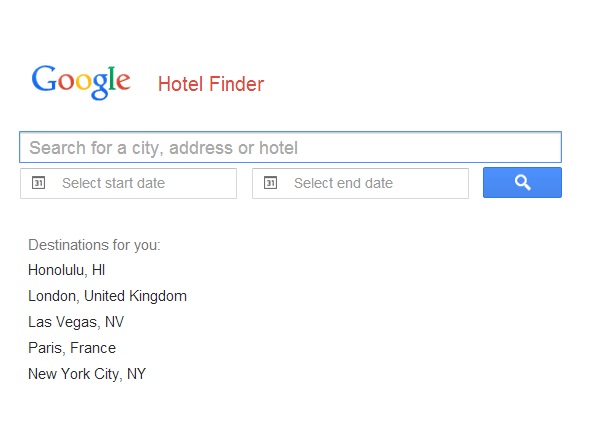Towards the end of 2012, Google began rolling out its one-stop accommodation planning tool Hotel Finder into standard search results worldwide. Two years on, let’s take a closer look at how the service has evolved and its impact on the online travel sector so far.
What is Hotel Finder? A quick reminder
As you would guess from its name, Hotel Finder is designed to help Google users search for accommodation properties that meet their needs based on criteria such as date availability, rating, price, amenities and location. It displays relevant results along with reservation options in one convenient dashboard. Online Travel Agents can pay to appear at the top of the search results with promoted placements, which is how Google makes its money from the tool.
As noted earlier, Google has incorporated Hotel Finder content into standard search results. Make a search for ‘New York Hotels’ and you’ll be presented with a selection of listings from Hotel Finder at the top of organic search results.
Tests and Updates
As with all its products, Google is continually testing and changing Hotel Finder to deliver the best possible service to its users and secure its hold over another search niche. In June 2013, the company gave travellers the chance to plan their trips on the move when the tool was rolled out across mobile platforms, and in the first few months of 2014 alone, additional features such as distance filtering, a ‘See Inside’ functionality which allows users to take a ‘virtual tour’ of enabled properties, and changes to make the date selector tool more prominent, have all made an appearance.
What does Hotel Finder mean for SEO?
So, since sponsored Hotel Finder results have found their way onto the first page of standard search results, where does that leave organic hotel listings and the future of SEO in the travel sector in general? The jury’s still out. While it’s true that Hotel Finder results have pushed organic listings for properties and OTAs down the rankings, there’s not yet enough concrete data to gauge just how much the changes have impacted businesses relying on this unpaid-for traffic.
One thing that is clear – Google is dedicating highly valuable advertising real estate in the SERPs to a product which some dismissed as an ‘experiment’ when it was first rolled out. As the tool inevitably gathers users worldwide, securing a prominent listing with plenty of reviews will become another important strategy for promoting your property and standing out against your competition online.
Is your hotel or resort listed on Google Hotel Finder yet? Are you planning on participating in the cost-per-click advertising program? Contact us today for more information on getting listed with Google Hotel Finder.
RELATED PAGES AND BLOG POSTS:
– Get Started on Google Hotel Finder
– 3 Travel Marketing Trends For 2014

